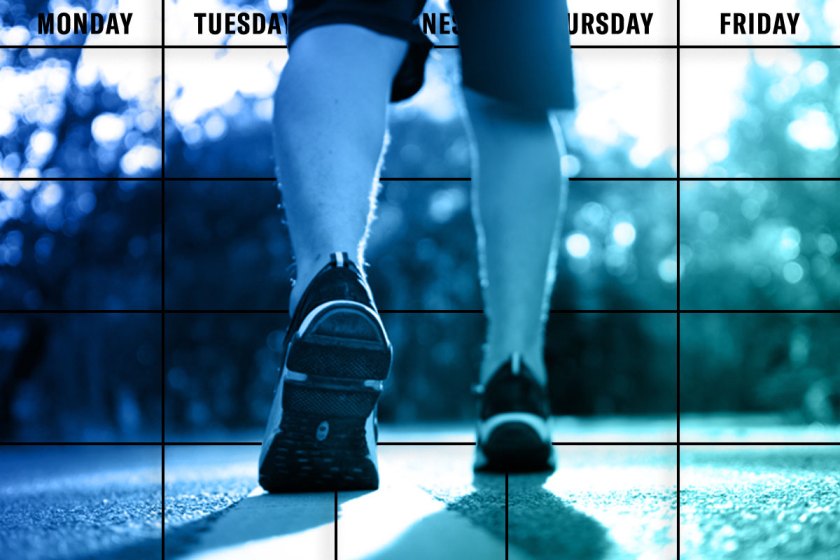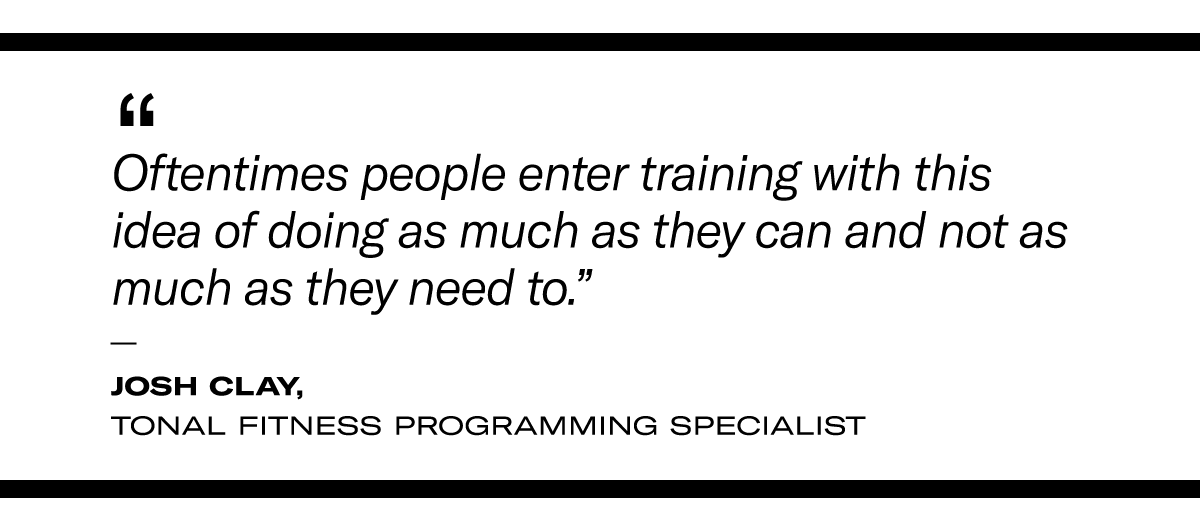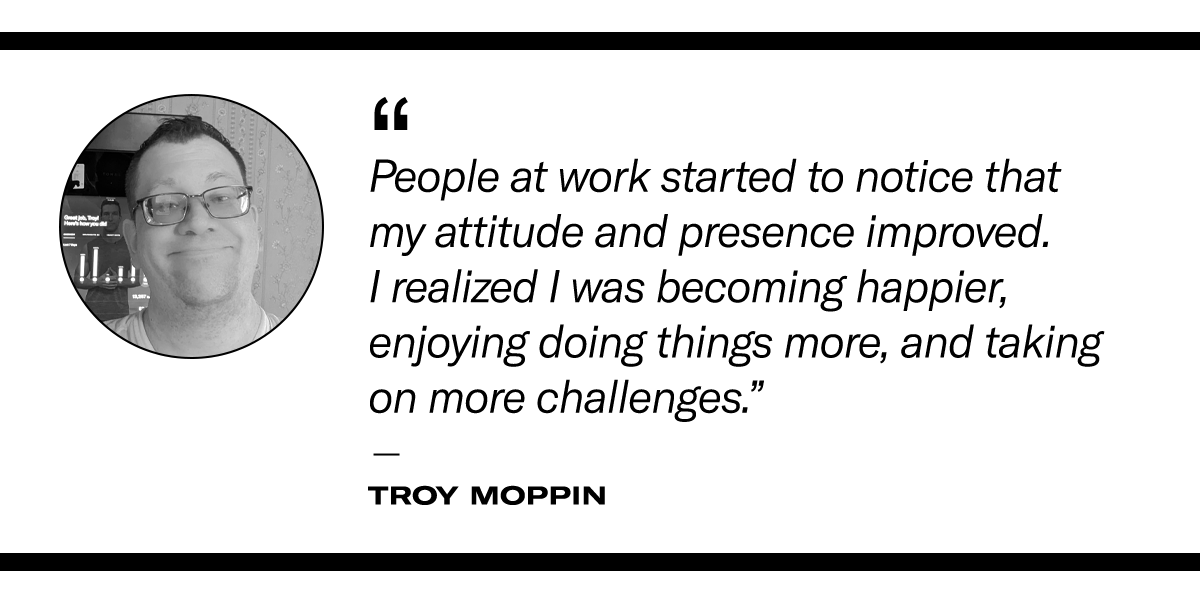Research shows that beginners have the most to gain from simply starting to move.

Troy Moppin reached a turning point in his life when he maxed out the scale at his workplace’s health clinic. The 36-year-old juvenile correctional officer from Holton, Kansas, had to step on a laundry scale to discover he’d reached his heaviest weight ever: 353 pounds. “I was like, I can’t do this anymore,” he says. “I couldn’t walk up a flight of stairs without sweating profusely. I felt miserable.”
Moppin had a long road ahead of him to achieve his goals of losing weight and building muscle, but he had one major advantage in his corner: He was a beginner. As disheartening as maxing out that scale was to Moppin, it also triggered a fresh start.
The Psychology of Beginning
In her research, behavioral scientist Katy Milkman, author of How to Change, found that people are more likely to stick with a habit if they start on a day that marks a new beginning, like the first day of the year or week, a birthday, or a time with personal significance, like Moppin’s eye-opening weigh-in. Milkman writes in her study on fresh starts that your motivation strengthens by having a new beginning because it allows you to psychologically distance yourself from the person you used to be.
This doesn’t just apply to exercise; Milkman’s research shows having a fresh start has also been effective in working toward financial goals. By drawing a line in the sand between his old, sedentary life and his new, active one, Moppin consciously started a new chapter.
While you can get back on the horse at any time (like if you’ve fallen out of the habit of exercising), starting from scratch is a unique opportunity. It’s intimidating to try something new, but tapping into “beginner’s mind,” a term derived from the Zen Buddhist concept of shoshin, is a chance to explore a subject with a sense of childlike open-mindedness and curiosity that fosters growth.
In his book Beginners: The Joy and Transformative Power of Lifelong Learning, journalist Tom Vanderbilt describes the sensation of approaching a new pursuit with a beginner’s mind: “As you plunge into learning some art or skill, the world around you appears new and bursting with infinite horizons. Each day brims with new discoveries as you take your tentative first steps, slowly pushing the bounds of exploration.”
The process of learning a new skill can even have spillover benefits. In a 2020 study, a group of older adults spent three months learning new activities including drawing and music composition. Afterward, their performance in cognitive tasks—unrelated to their new skills—improved.
The Ability to Adapt Quickly
In fitness, gains are great. But the gains made by beginners are even more pronounced. To make just a sliver of improvement in strength or speed, elite athletes must train for hours each day, fine-tuning the smallest details of their workouts, nutrition, and recovery. On the other hand, beginners like Moppin have the potential to see huge performance upswings from exercise with minimal time commitment.
“Oftentimes people enter training with this idea of doing as much as they can and not as much as they need to,” says Josh Clay, a certified strength and conditioning specialist and Fitness Programming Specialist at Tonal. Because beginners are at an untrained baseline level, he says, three to five short but effective workouts per week will be enough to create change without leaving them so sore they won’t want to keep going.
“Intensity drives adaptation,” says Clay, explaining that intensity is a relative term. If you’ve been strength training for years, you might need to load up hundreds of pounds in your squat to gain strength, but someone new to lifting will notice change solely from doing bodyweight squats. “Beginners put on strength and muscle so quickly because their threshold is lower, so they don’t need super high stimuli in order to drive adaptation.”

Moppin, for example, began losing weight by walking around his block one lap at a time. When he decided to add in resistance training, Tonal made it easier than ever to learn the basics. “I hadn’t done any kind of strength training since I was in high school, and I didn’t know how. I had no clue,” he says. “With a machine telling you want to do, what weight to use— it takes the guesswork out.” Moppin describes his first program, Basic Body Split with Coach Pablo Escobar, as both “rough” and “awesome.”

According to Clay, beginner programs on Tonal like this one are designed specifically for the needs of new exercisers. Each workout includes no more than three exercises per block to mitigate feeling overwhelmed. The workouts repeat each week so members become familiar with the moves. “The goal is to improve movement proficiency,” says Clay. “Because if we can move better, we’re going to be more stable, get stronger, and build muscle.”
The Physical and Emotional Benefits
K. Michelle Singleton, a lecturer in exercise and sport science at Coastal Carolina University and a certified personal trainer, has experience working with beginners both in the gym and in her research. By doing workouts like the ones Clay describes, she says beginners will quickly make neuromuscular adaptations. These new stressors allow for more efficient recruitment of muscle fibers. Singleton says beginners will also see quick improvements in hypertrophy, or muscle mass.
Moppin witnessed this transformation firsthand as he got stronger and fitter, lifting more weight in each exercise and more total volume in each workout.
The changes weren’t only physical. Almost immediately upon finishing his first Tonal workout, Moppin felt a shift in his mood and energy level. “People at work started to notice that my attitude and presence improved,” he says. “I realized I was becoming happier, enjoying doing things more, and taking on more challenges.”

Singleton isn’t surprised to hear of a beginner experiencing such a huge mood boost at the start of an exercise routine. She says emotional benefits, like improvements in mood and body image, and better ability to deal with stress, are all commonly reported in new exercisers.
The Power of Community
Even the most accomplished fitness professionals were beginners at one point. For Tonal Coach Kendall “Woody” Wood this moment came when she took up boxing in 2015. At the time, she was working in digital media, and it had been years since she last lifted weights. She began working on fundamental strength movements with friends at a boxing gym. It didn’t take long to see how resistance training helped her boxing, a sport that engages nearly all the major muscle groups. The experience was so powerful that it ultimately motivated her to pivot careers and become a certified personal trainer.
Singleton’s work suggests that part of Wood’s success likely came from training alongside others with similar goals. A common pitfall for beginners is losing their initial enthusiasm as time goes on and life’s demands get in the way. Singleton says surrounding yourself with people who encourage you to make good choices is a proven strategy for staying motivated. “Using the people and resources around you is what’s going to keep you going when it comes to the psychological aspect of pushing past that initial feeling,” she says.
Moppin knows the value of drawing on others for support. He’s gotten his wife involved in Tonal, as well, and he’s a regular on the Official Tonal Community Facebook group, where he gets inspiration from others and has even become a source of advice for those just beginning their journeys.
He’s faced setbacks himself, including not completing a workout or slipping on his nutrition, but seeing others in the community go through similar struggles gives him the determination to get back on track. “Sharing those experiences made me realize this happens to everybody, even the people who are super intense, bodybuilder types,” he says. “They’ve done it, too. We’re all human. It’s a hard process. Sometimes you mess up, and it’s okay to mess up.”

Start the Journey
It’s been a year since Moppin’s life-changing moment on the laundry scale, and he says he’s now “an entirely different person.” He’s more energetic, healthier, happier, and—one thing’s for sure—no longer a beginner. Now, he’s tackling advanced Tonal programs, including Four Weeks to Fat Loss and Hyped Up Hypertrophy, and using all the skills he learned to propel him to a new level of achievement.
“The learning curve can be somewhat intimidating, but it makes the journey that much more gratifying,” says Wood. “You’re becoming a lot more aware of your body and what it’s capable of, and also becoming educated on what strength training is and what it can do for you.”


